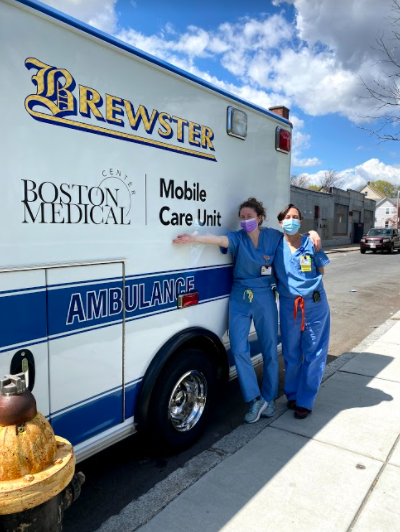
Regular medical care throughout pregnancy helps to catch potential concerns early and reduce health risks during and after birth. Statistically, asylum seekers and refugee women are at higher risk of adverse pregnancy outcomes, including an increased probability of preterm birth and admission to neonatal care units. Access to prenatal health care can improve the health of the mother and newborn baby, but the services are for naught if the expectant mothers can’t reach them.
Certified Nurse-Midwife Anissa Dickerson, CNM, and her team at Boston Medical Center’s Refugee Women’s Health Clinic are working to address this challenge—bringing prenatal care directly to patients who face barriers getting into the clinic.
Changing the course of prenatal care
Without regular checkups, issues such as gestational diabetes may go unchecked, putting the mother and infant at risk. Yet staying on top of all these visits isn’t always easy. Expectant moms who have been forced to leave their home country often face compounded hurdles—from finding affordable housing to transportation.
Boston Medical Center’s Refugee Women’s Health Clinic provides culturally-sensitive women’s health services to refugee, asylum seeking and recent immigrant communities across the Greater Boston area. When the pandemic started, the center’s co-directors Dickerson and Wan-Ju Wu, MD, MPH, realized how difficult and anxiety-inducing it was for many patients to come into the clinic, so they began bringing midwife and obstetrics and gynecology (OBGYN) services into the community. The team travels to outer locales such as Waltham and Woburn to see patients and conduct visits in the back of an ambulance, generously donated by Brewster Ambulance.
Having a mobile clinic makes it easier for these patients to receive more consistent care. “Many of our patients have experienced trauma, and having time and trust and continuity of care is so important,” says Dickerson.
Patients appreciate having a familiar face who’ll hear their concerns and be with them through their journey. Likewise, clinicians found that face-to-face communications help them to truly understand what’s happening in each patient’s life and support them in a wider capacity. “It’s an immense privilege to care for women in our mobile clinic and then to be there to help them through labor,” says Mary Elise Lynch, MD, a recent Boston Medical Center residency graduate who worked in the mobile clinic.
Offering culturally-sensitive care
Clinic team members approach their work with a deep sense of humility and gentleness. When they’re in the field, the clinic’s midwife and OBGYN are able to spend more one-on-one time with each patient to support them throughout their pregnancy and beyond.
“Many of us at the clinic have worked overseas, and our patients are accustomed to a different structure of medicine where community health workers play a key role,” says Lynch. “Having health care that reflects where patients are from is a way to show cultural respect on another level. It’s been a beautiful way to connect with our patients.”
Breaking down barriers
Many patients can’t afford to live close to the city, and it can take hours to travel to and/or from the clinic for care. The program helps women who are refugees or asylum seekers to prepare for labor and birth, literally and figuratively where they are. In addition to offering checkups, OBGYN care, vaccinations and family planning support, the clinicians work through a holistic needs assessment. They support expectant mothers with whatever resources they can, from food to baby clothes, and connect families with additional resources in their local community.
“One of the best things about the initiative to me is the social justice approach,” says Mobile Case Manager Jake Savage. “We’re transferring that burden of transportation from the patient to us. That feels like justice is being served. It’s a way of turning the usual approach to care upside down that allows us to be more culturally adaptive and sensitive.”
Empowering patients
“Many patients have previous experiences of being told what to do when it comes to their bodies,” adds Savage. “Our job is to present patients with options and let them know we’re there to support them. When we give options to patients, they learn that they can be an active participant in their care. That is justice in action.”
Savage recalls one patient who came to the United States seeking asylum from Ethiopia, and was forced to spend much of her pregnancy away from her husband until they were reunited here in Boston. “During one of our later visits, the husband and wife met us together with their baby,” he concludes. “It felt like a really special moment to see them happy and healthy.”